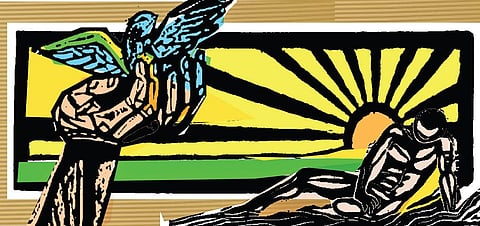

In India, we have forest fires. Locusts. An almost-super-cyclone. All through a raging pandemic, with millions walking the streets to reach home.
Some whose homes have disappeared overnight, while others have been trapped within their homes and are now taking their first tentative steps in the outside world, fearing the wrath of a tiny virus.
If this were my novel, my agent would call it implausible. And yet, it is the truth of our times.
A quote from Charles Dickens’ A Tale of Two Cities defines our experience of 2020 so far: “It was the best of times, it was the worst of times, it was the age of wisdom, it was the age of foolishness, it was the epoch of belief, it was the epoch of incredulity, it was the season of light, it was the season of darkness, it was the spring of hope, it was the winter of despair.”
We’ve had all sorts of reactions to the catastrophe. Some of us try and cordon ourselves off and try to cadge whatever ‘normalcy’ we can, from ourselves and each other. Others are aware of our privilege in doing so, and point it out.
Yet others step out to help or help even while staying in. Students and non-profits have mobilised in groups, and are trying to aid those affected by Covid-19, either by distributing ration, or helping the ones walking home with food and water.
The Kerala government (or at least its health ministry) has taken a lead, and is being followed by its citizens.
As to the rest of our nation, crossing all political and faith divides, the reaction is tentative, exploratory. We are trying to flatten the curve, or we’re trying to live with the virus in a collapsing economy.
Opinions will vary depending on our politics, but it is clear that it is we who have been flattened by cyclones, locusts, and mass exodus amid a pandemic.
While there’s government action at least on the locusts, with drones and pesticides, there is less immediate leadership on other fronts.
Having been on the fringes of some of the citizen initiatives, volunteering with them online, I’m inspired by the men and women of all ages who are leading collection drives, handing out rations, building community kitchens, replanting trees felled by the cyclone and helping rebuild lost homes.
The non-resident Indian community seems to have rallied with funds, setting up websites, teaming up with local citizen groups and non-profits who are surveying and addressing the needs on the ground. In a country of political dealers, leaders have emerged.
In all of this, I’ve wondered time and again why we do not have such citizen leadership at normal times. Why do those who have come forward now in empathy not step into our politics? Why don’t we see them as a genuine alternative during elections?
Why do issues like the environment, the need to feed the hungry, and the burgeoning inequalities in our society not give birth to selfless leaders in normal times?
As a wise friend said, it is chaos that leads to order, and order to chaos. In that famous black and white circle of yin and yang that we have all seen—the white shape is positivity, the black is chaos and negative forces.
But there’s a dot of white sitting right in the black, and a black dot bang in the centre of the white space. Positivity emerges from chaos, and in some ways we need the winter of despair (I’m aware of the irony of it arriving amid scorching Indian summers!), to arrive at the spring of hope.
Seen as a race and a nation, we’ve been unwise in some of our choices. We’ve taken Nature for granted, and She is, rightfully, showing us who is boss.
We’re beginning to understand the need for balance, the foolishness of unbridled individualism and consumerism.
May we all come into the wisdom of being a part of Nature and a community of interdependent humans. May we all stand up to be counted beside each other and become leaders guided by empathy, to protect this country and the planet we all call home.